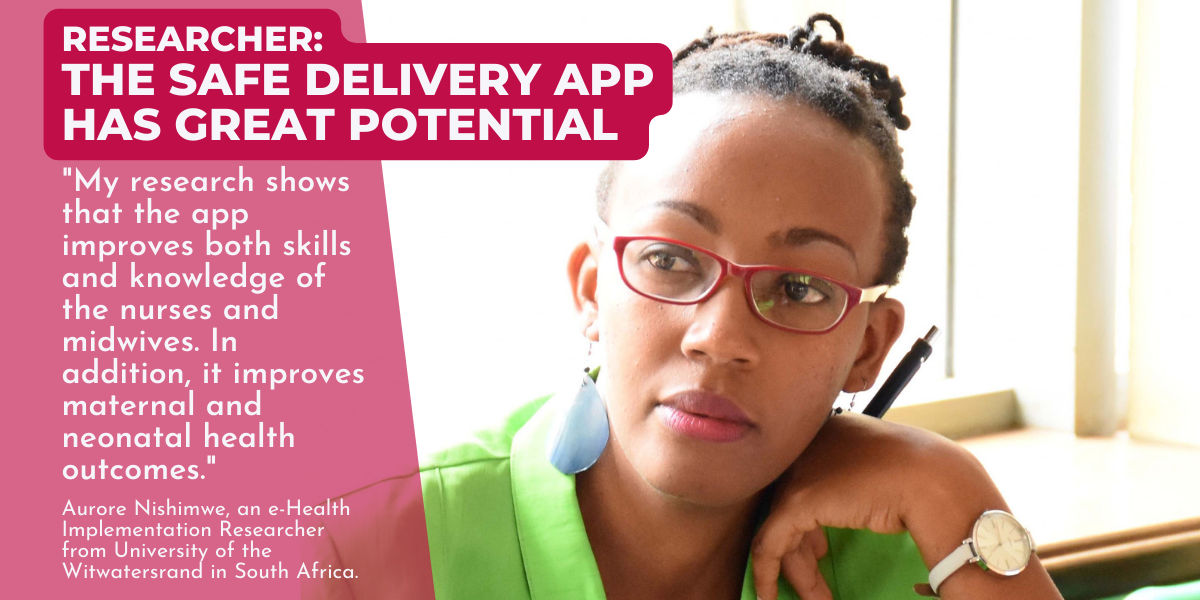“The Safe Delivery App has great potential”
“The Safe Delivery App has great potential”
Meet Aurore Nishimwe, a Rwandan e-Health Implementation Researcher from University of the Witwatersrand in South Africa who has been scrutinizing Maternity Foundation’s digital health tool, the Safe Delivery App as part of her PhD thesis.
The Safe Delivery App is a free application for smartphones and tablets. It works as a professional job aid and a digital training and learning tool for midwives and other healthcare workers. It covers the most common pregnancy and childbirth related complications and supports midwives and healthcare workers in ensuring safer births for women and their newborns.
So far, Aurore has published five articles about the impact of the app and overall, she finds very positive results:
“Generally speaking, my research shows that the app improves both skills and knowledge of the nurses and midwives. In addition, it improves maternal and neonatal health outcomes,” says Aurore in an attempt to summarise the results of her various publications about the app.
Addressing key challenges
Aurore came across the Safe Delivery App as a coincidence when looking for research topics back in 2018, three years after the app was initially launched. She found out about the app being piloted in Ethiopia and reached out to Maternity Foundation to test it in Rwanda.
“I was interested to test whether the app would work in practice in the Rwandan context. Here is a great research topic for my PhD, I thought to myself”, Aurore explains.
The Safe Delivery App is designed for midwives in Low- and Middle-Income Countries (LMIC) where key challenges include insufficient skills, lack of continuous learning opportunities, and limited access to evidence-based clinical guidelines among midwives and other healthcare workers which impact their daily clinical decisions.
“When I talked to health professionals in Rwanda, they all said they lacked standardized guidelines and access to updated information”, Aurore explains.
Aurore tested the app in the Rwandan context and her findings suggest the Safe Delivery App can help address these challenges and, as an end-result, help prevent mothers and their newborn from dying or being harmed by the pregnancy and birth.
For instance, Aurore found that fewer women and newborns got transferred to larger hospitals, simply because the heath staff became better at handling complications after being introduced to the Safe Delivery App.
A good tool, says the midwives
To fully understand the impact of the app, Aurore has also been interviewing multiple midwives and other healthcare staff, telling her about the use of the app in their daily work.
“The nurses and midwives were generally very excited about the app and perceived it as having improved their ability to manage childbirth complications. They indicated general agreement that the Safe Delivery App is easy to use, is an effective decision support tool, and training tool,” Aurore says.
Great potential
The app was invented back in 2015 together with midwives, the University of Copenhagen and the University of Southern Denmark to help fight maternal morbidity, mortality, and harm. The task is enormous: Globally speaking, every other minute, a woman dies during pregnancy or birth. Every sixth second, a newborn suffers the same fate. For every woman who dies, 20 – 30 women suffer preventable injuries, infections, or become disabled from causes related to pregnancy or childbirth.
Aurores research is based on use of the app in selected parts of Rwanda, and Aurore hopes to continue her research in a new position within the university to further explore the app’s scalability and sustainability throughout Rwanda
“Based on my research, the app definitely has great potential”, she says.
Aurore also mentions ideas for future developments of the app. She tells how the midwives using the app asked for additional features and functions, including development of a discussion forum to allow the users across different hospitals and countries to share experiences about managing obstetric emergencies.
In Maternity Foundation, CEO Anna Frellsen welcomes the ideas.
“Aurore’s research, being both qualitatively and quantitatively based, is a great basis for Maternity Foundation to further develop the app. We continuously look at developing new modules and in the coming months, we plan to add modules on family planning and mental health to the app”.
Want to know more?
Check out our impact website with contain all studies done on the Safe Delivery App, including the ones by Aurore.





